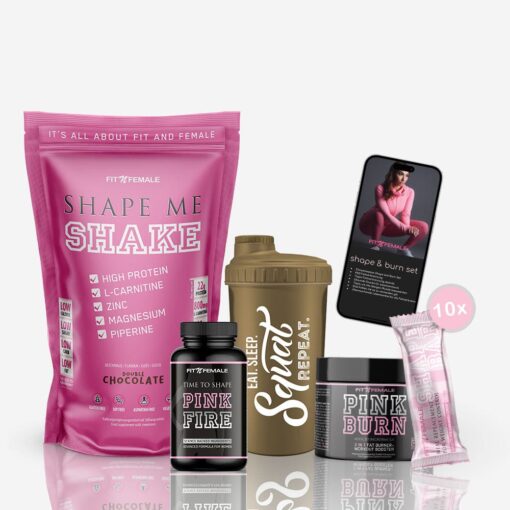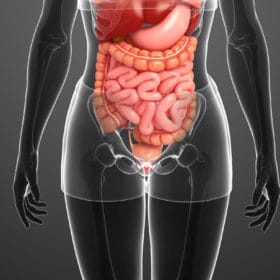Many women have a false idea of what "eating enough" really means. Paradoxically, this becomes a major problem, especially when trying to lose weight, because those who eat too little under false assumptions are not heading for a healthy body, but suffer a performance- and metabolism-related shipwreck in every respect. But what is the reason for this?
Tracking down the causes
Probably the most common cause for the shifted perception is reading the countless fitness and lifestyle magazines that make full-bodied promises with newfangled 1,200-calorie nutrition plans, but which they cannot keep from the outset. In addition, there are various fitness trainers and experts who propagate completely different and at the same time radical approaches with regard to the renunciation of fat or carbohydrates, which, in combination with the recommendation of high-intensity training, puts the crown on the whole disaster. The resulting energy deficits quickly push your body to its evolutionary biological limits, so it's no wonder that performance and weight development stagnate after a certain point. Our body is not a static machine.
While this effect can still be clearly proven with figures, the second cause of insufficient food intake lies in the psyche of us women, which is strongly influenced by social conventions. Typically, men compete to see who can finish the most plates at the Chinese buffet or who can eat the biggest schnitzel. For us women, however, it's quite different, or haven't you often held back on eating in the presence of other people so as not to attract unpleasant attention from other women or your new date? This behavior is also supported by subtle messages in the media, which suggest that women eat little and eat best on three lettuce leaves and a tomato. It should be clear that this social brainwashing torpedoes any progress.
How too little food intake affects training and fat loss
The fact that a large calorie deficit does not help much is simply due to the mechanisms of evolution, which prevented us from starving at the time when food was still scarce. If you have too large a calorie deficit of significantly more than 500 kilocalories and maintain this over a longer period of time, you will not lose more fat, but fall into the stagnation trap. Our body is a dynamic machine that adapts perfectly to the conditions and is primarily geared to safe survival. So if you eat too little food, the body shuts down its metabolic rate and reduces all dispensable bodily functions in favor of vital processes.
On the one hand, this leads to lower energy consumption, but on the other hand also to a change in the hormonal milieu. For example, there is a reduction in the production of thyroid hormones and sex hormones and, in turn, an increase in stress hormones such as cortisol. As a result, in this survival mode, your body desperately tries to keep every ounce of fat and instead breaks down "useless" consumers such as muscle.
Cause of the yoyo effect
This hormone cocktail not only makes it impossible to build muscle and lose body fat, but also has other serious consequences. Particularly annoying is the increased efficiency with which your body processes nutrients as soon as they are available again in sufficient quantities. This means nothing other than that your body has learned from this "famine" and tries to store every gram of food particularly efficiently in the form of body fat in order to be better equipped for the next "famine". We commonly know this effect as the yo-yo effect, which shovels weight back onto our ribs faster than we lost it. It is therefore important after a diet to gradually increase calorie intake over a longer period of time in order to avoid this unwelcome effect. But it would be better, of course, if you could avoid it altogether by eating sensibly.
Too little food intake sabotages regeneration
Of course, the low energy level also makes itself felt in training, because in purely physical terms it is not at all possible for you to perform at your best in the weight room or during High Intensity Interval Training, even if you feel that way after the workout. Worse, the extreme lack of energy and macro- and micronutrients also hinders post-workout recovery, which in turn sets in motion a vicious cycle of decreased performance, decreased success, and increased susceptibility to injury and illness. Not to be neglected is also the reduced quality of sleep, which both negatively affects recovery and ensures that our body tries to retain as much body fat as possible due to high stress hormone levels.
More symptoms
You can tell that you are not eating enough to reach your goals not only by the stagnation of fat loss. Rather, there are a number of symptoms that your body is using to signal you to pull the ripcord:
- Listlessness
- Sleep disorders
- Strong mood swings
- Concentration disorders
- Hair loss
- Persistent feeling of cold
- Menstrual cycle disorders
- Infertility
- Blockages
- Cravings
- No desire for sex
If you also notice some of these symptoms, you should check whether you are actually eating enough and adjust your eating behavior accordingly. You can quickly see whether this is the case, because the symptoms usually disappear quickly. If this is not the case, however, it makes sense to consult a doctor.
How can I achieve my goals?
But before you start messing around with numbers, you should get yourself a calorie counter app and a food scale to be able to track your calorie intake precisely. In addition, it is very important that you ensure that your body is also supplied with sufficient amounts of all important nutrients, because without this basic requirement, fat loss will not work. The ideal macronutrient composition is 40 percent carbohydrates, 35 percent fats and 25 percent proteins. This is the basis on which you plan your diet.
How much do I need to eat?
How many calories you should consume to reach your goals in a healthy way is highly individual, and depends on countless metabolic factors. Therefore, the actual calorie requirement can only be approximated without the use of professional equipment. As a basis for the calculation, you can use your body weight and multiply it by a factor of 24. This results in your basal metabolic rate, i.e. the amount of energy your body needs to keep your metabolism running without you moving a single meter.
This basal metabolic rate should not be fallen short of in the context of your diet and accordingly serves as a critical lower limit, since otherwise the consequences already described above threaten. Then multiply your calculated basal metabolic rate by the so-called PAL value that applies to you. This "Physical Activity Level" indicates how active you are during the day.
| PAL value | Description | Example |
|---|---|---|
| 1,2 | only lying or sedentary lifestyle | old and infirm people |
| 1,4-1,5 | Almost exclusively sedentary job with few leisure activities | Office work |
| 1,6.1,7 | predominantly sedentary work, supplemented by occasional standing and walking activities | Students, laboratory assistants |
| 1,8-1,9 | predominantly walking or standing activity | Craftsman, waiter |
| 2,0-2,4 | strenuous physical occupation | Forest worker, high performance athlete |
The result of the resulting calculation is your activity metabolic rate, which indicates how many calories you consume on a normal day without doing any additional exercise. On a day when you go to the gym, you also add the calories consumed.
Based on these consumption values, you now determine your daily calorie intake by subtracting 300 to a maximum of 500 kilocalories from the previously calculated value. With the help of this moderate calorie deficit, it is possible for you to slowly reach your goals without your body switching too quickly to the emergency metabolism. However, it is important at this point that you remember to adjust your calorie intake parallel to your decreasing weight every four weeks, otherwise the calorie deficit will naturally disappear.
Conclusion
The bottom line is that too little food intake is at least as unhealthy in the long run as unrestrained overeating. This makes it all the more important that you eat according to your needs with the help of a calorie counter, because this is the only way you can achieve your best performance during training and at the same time sustainably reach your visual and performance goals. So break out of the social cage and experiment a little with your diet until you find the configuration that suits you. Then, at the latest, all salad pickers and bean counters will be green with envy.








